Alumni Bookshelf
James R. Adams, BA ’55,
founder of the Center for Progressive Christianity,
is the author of From Literal to Literary:
The Essential Reference Book for Biblical Metaphors
(Rising Star Press, 2005). A guide to the complexities
of interpreting biblical language, the book
provides analysis of the original connotations
of more than 150 biblical metaphors in Hebrew
and Greek, providing insight into the cultural
nuances they have since accrued.
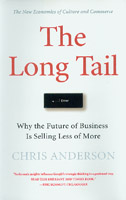 In
The Long Tail (Hyperion, 2006), Chris
Anderson, BS ’81, demonstrates
how the Internet is changing the way business
is conducted in modern society and reveals truths
about what consumers want and how they want
to get it. Anderson coined the title phrase
to explain how American culture and economy
are shifting focus away from “hits”—mainstream
products and markets—toward an evolving,
expanding universe of niche products and businesses.
In
The Long Tail (Hyperion, 2006), Chris
Anderson, BS ’81, demonstrates
how the Internet is changing the way business
is conducted in modern society and reveals truths
about what consumers want and how they want
to get it. Anderson coined the title phrase
to explain how American culture and economy
are shifting focus away from “hits”—mainstream
products and markets—toward an evolving,
expanding universe of niche products and businesses.
An authority on animal cruelty, Arnold
Arluke, BA ’69, MA ’71,
asserts that society cannot effectively combat
abusive behavior without understanding the cultural
roots from which it springs. In Just a Dog:
Understanding Animal Cruelty and Ourselves
(Temple University Press, 2006), he explores
the motivations and self-perceptions of those
who engage in animal abuse.
Linda Barnes-Robinson, MA ’68,
a former educator and an advocate for the rights
of students with learning disabilities, is the
co-author of Smart Kids with Learning Difficulties:
Overcoming Obstacles and Realizing Potential
(Prufrock Press, 2006). This guide for parents,
educators, and counselors covers topics including
identifying and recognizing gifted and learning
disabled students, tools and checklists to build
supportive learning environments, and information
on the roles and responsibilities of parents.
And The Word Was (Other Press, 2006)
is the debut novel by Bruce Bauman,
BA ’75, in which global politics
affect and mirror intense personal drama. An
American doctor, Neil Downs, searches for a
renewal of faith after losing his son in a school
shooting. When Downs’ medical expertise
cannot save his son and his spirituality cannot
save his faith in his marriage, he travels to
India in the hope of redemption.He meets Levi
Furstenblum, an author and Holocaust survivor
whose writings contend that the universe is
without meaning. Downs also engages in an affair
with Holika, a beautiful, well-connected woman
whose politics challenge Indian social mores.
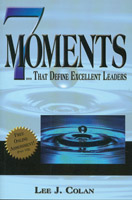 Lee
J. Colan, MPhil ’87, PhD ’93,
is founder of The L Group, a team of business
advisers. He is the author of numerous motivational
books, including 7 Moments that Define Excellent
Leaders (CornerStone Leadership Institute,
2006), which explores the decisive instants
during which leadership abilities are tested.
More information is available at www.theLgroup.com.
Lee
J. Colan, MPhil ’87, PhD ’93,
is founder of The L Group, a team of business
advisers. He is the author of numerous motivational
books, including 7 Moments that Define Excellent
Leaders (CornerStone Leadership Institute,
2006), which explores the decisive instants
during which leadership abilities are tested.
More information is available at www.theLgroup.com.
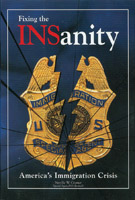 Former
Immigration and Naturalization Service special
agent Neville Cramer, MA ’79,
is the author of Fixing the INSanity: America’s
Immigration Crisis (Immigration Enforcement
Solutions, 2005), an insider’s account
of the numerous problems facing INS officers
and other immigration officials.
Former
Immigration and Naturalization Service special
agent Neville Cramer, MA ’79,
is the author of Fixing the INSanity: America’s
Immigration Crisis (Immigration Enforcement
Solutions, 2005), an insider’s account
of the numerous problems facing INS officers
and other immigration officials.
Steven Dresner, BA ’92,
is a contributor to Reverse Mergers: Taking
a Company Public Without an IPO (Bloomberg
Press, 2006), a guide to the process of reverse
mergers for executives and the investment bankers,
lawyers, and auditors who advise them. Topics
covered include the pros and cons of going public,
deal structures, financing, the regulatory environment,
working with companies from other countries,
and spotting unethical deals and dealmakers.
How Would a Patriot Act: Defending American
Values from a President Run Amok (Working
Assets, 2006), by Glenn Greenwald, BA
’90, outlines the necessity of
assuming political agency in the post-9/11world.
Greenwald is a constitutional law attorney and
author of the political Web log Unclaimed Territory,
http://glenngreenwald.blogspot.com.
Greenwald has written for American Conservative
magazine and appeared on a variety of television
and radio programs, including C-SPAN’s
Washington Journal, Air America’s
Majority Report, and Public Radio International’s
To the Point. His reporting and analyses
have been credited in The Washington Post
and a variety of other print and online publications.
Bob Hoffman, EdD ’97,
is the co-author of Meeting Excellence:
33 Tools to Lead Meetings That Get Results
(Jossey-Bass, 2006). The book is a comprehensive
resource that provides a wide range of tools.
It offers the information and tools needed to
prepare, facilitate, and evaluate meetings.
Beyond Initial Response (Authorhouse,
2006), co-written by Vickie Huyck, MPA
’02, and Gary Merrick,
MHRD ’01, details the process
and principles of the National Incident Management
System’s Incident Command System. The
book is intended to shed light on unfamiliar
processes, allowing responders to act more confidently
and efficiently.
From the Washington Monument to the 1913 Armory
show to 9/11 memorials, controversies about
art exhibitions, memorials, and public art have
abounded in the United States. In Visual
Shock: A History of Art Controversies in American
Culture (Knopf, 2006), historian and Pulitzer
Prize winner Michael Kammen, Hon. MA
’91, discusses the cultural value
of such art-related uproar, arguing that it
is both destabilizing and educational, indicative
of healthy social change and increasing democratization.
Roger Kaufman, BA ’54,
is the author of a guide to the process of making
leadership choices, 30 Seconds That Could
Change Your Life: A Decision-Making Guide for
Those Who Refuse to be Mediocre (HRD Press,
2006). He also is the author of Change,
Choices, and Consequences: A Guide to Strategic
Thinking and Planning (HRD Press, 2006),
a book on organizational success.
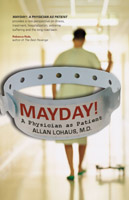 Signposts
to Elsewhere (Sun Rising, 2006), by Yahia
Lababidi, BA ’96, is a book of
short poetic meditations called aphorisms. It
is illustrated by Kuwaiti artist Ghadah Al Kandari.
Lababidi is an internationally published author
and for nine years was editor for UNESCO’s
Cairo office in Egypt. In 2007, a collection
of Lababidi’s writings will be featured
in the Encyclopedia of the World’s
Best Aphorists by TIME editor
James Geary.
Signposts
to Elsewhere (Sun Rising, 2006), by Yahia
Lababidi, BA ’96, is a book of
short poetic meditations called aphorisms. It
is illustrated by Kuwaiti artist Ghadah Al Kandari.
Lababidi is an internationally published author
and for nine years was editor for UNESCO’s
Cairo office in Egypt. In 2007, a collection
of Lababidi’s writings will be featured
in the Encyclopedia of the World’s
Best Aphorists by TIME editor
James Geary.
Allan Lohaus, MD ’68,
recounts his experience on both sides of the
doctor-patient relationship in Mayday!:
A Physician as Patient (Synergy Books,
2006). During a debilitating illness, Lohaus,
a gynecologist, is forced to confront questions
of faith, meaning, and mortality. More information
can be found at www.maydaybook.com.
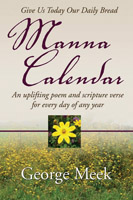 Containing
a poem and scripture verse for each day of the
year, Manna Calendar (Pleasant Word,
2006) is the latest work from George
Meek, MA ’73.
Containing
a poem and scripture verse for each day of the
year, Manna Calendar (Pleasant Word,
2006) is the latest work from George
Meek, MA ’73.
 A
former editor for Business Week Asia, Sheridan
Prasso, BA ’88, explores the
Western fascination with and perception of Asian
sexuality in The Asian Mystique: Dragon
Ladies, Geisha Girls, And Our Fantasies of the
Exotic Orient (PublicAffairs, 2005). Prasso,
who has lived in Phnom Penh, Cambodia, and Hong
Kong, takes the reader through the girlie bars
of Bangkok and Manila, the personals of the
Village Voice, the cinemas and TV screens of
West and East, and the home of Mineko Iwasaki,
who inspired Arthur Golden’s Memoirs
of a Geisha, in her exploration of the
symbiosis of Western fantasy and Asian fulfillment.
A
former editor for Business Week Asia, Sheridan
Prasso, BA ’88, explores the
Western fascination with and perception of Asian
sexuality in The Asian Mystique: Dragon
Ladies, Geisha Girls, And Our Fantasies of the
Exotic Orient (PublicAffairs, 2005). Prasso,
who has lived in Phnom Penh, Cambodia, and Hong
Kong, takes the reader through the girlie bars
of Bangkok and Manila, the personals of the
Village Voice, the cinemas and TV screens of
West and East, and the home of Mineko Iwasaki,
who inspired Arthur Golden’s Memoirs
of a Geisha, in her exploration of the
symbiosis of Western fantasy and Asian fulfillment.
On June 8, 1917, a fire broke out in the main
shaft of a huge complex of copper mines 2,000
feet beneath Granite Mountain in Butte, Mont.
The fire raged for three days, killing 164 of
the about 400 men at work that day. The fire,
which was the worst hard-rock mining catastrophe
in American history, is the subject of Fire
and Brimstone: The North Butte Mining Disaster
of 1917 (Hyperion, 2006), by Michael
Punke, BA ’86. Punke is a lawyer
and novelist in Washington.
Walker Elliot Rowe, MBA ’93,
has published two books and is a vineyard owner
and winery investor. His new book (with Joanna
Walsh), Wine, Communism & Volcanoes:
A Story of Chilean Wine (Apprentice House,
2006), is a travelogue of Rowe’s three
months working the harvest at VIA Wines in San
Rafael, Chile.
Biblical lessons inspire environmentally responsible
living in Serve God, Save the Planet: A
Christian Call to Action (Chelsea Green
Publishing Company, 2006), a memoir of one family’s
journey toward a less materialistic lifestyle
by J. Matthew Sleeth, MD ’88.
Sleeth, a former emergency room director and
chief of medical staff, now writes, preaches,
and teaches full-time about faith and the environment.
Training Games: Simple and Effective Techniques
to Engage and Motivate Learners (ASTD Press,
2006) is a collection of prompts and activities
for corporate coaches co-written by Steve
Sugar, MBA ’72.